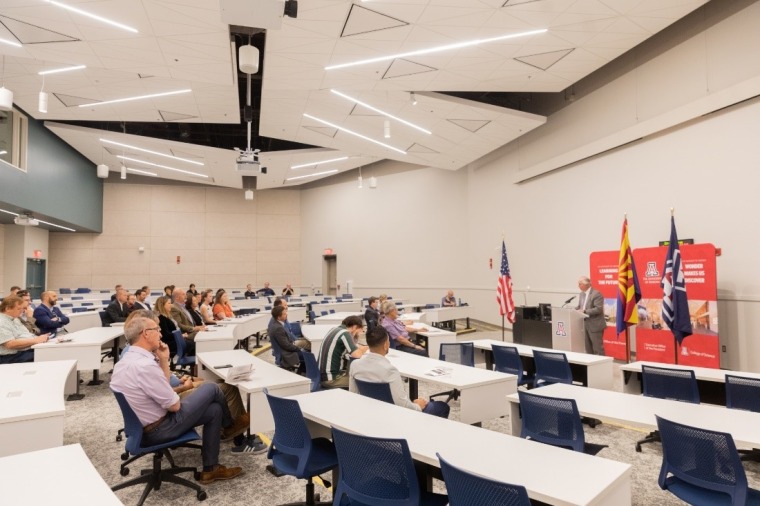
Summary
Academic year 2022-2023 was busy and dynamic, characterized by an increase in requests for accommodations from students and employees and, accordingly, an increased need for outreach and engagement with campus colleagues. Many requests for accommodations included an interest in flexibility, for example: a flexible work schedule, or flexibility with assignment due dates or class attendance. This prompted DRC staff to increase our engagement with faculty and supervisors and promote universal design strategies that could support flexibility without compromising rigor.
The Year in Review
In response to the tragic shooting that occurred on campus last October, DRC worked closely with the Critical Incident Response Team to update emergency protocols for disabled individuals. DRC was represented on the PAX Student and Employee Support Working Group to recommend best practices in crisis situations regarding accessibility. A DRC representative was also appointed by the University President to the Campus Safety Advisory Council. Internally, DRC had two sessions with UAPD on workplace safety and active shooter training and we have also updated our internal evacuation protocols.
A huge milestone for Adaptive Athletics was its induction into the Jim Click Hall of Champions this past fall. Now, UArizona’s adaptive athletes and Paralympians are celebrated amongst many other exhibits of Olympians, Pro Players, Spirit, Women's Athletics, and great moments in Arizona Athletics history, demonstrating once again the Unviersity’s commitment to disability inclusion.
Adaptive Athletics hosted its third cohort of international disabled athletes and coaches of adaptive athletics in partnership with the U.S. Department of State’s Sports Envoy Program. This year’s cohort was from Uganda, and they spent two weeks on campus this past September learning about adaptive athletics, coaching, and American higher education. DRC developed a partnership with the Professional Fellows Program on Inclusive Civic Engagement and hosted a Fellow from Kenya in the fall. From there, we established a relationship with United States International University of Africa in Nairobi, Kenya. Staff were invited to consult there in June and the two universities continue to be in touch to mutually support efforts to promote disability inclusion.
And, we continue to dedicate time to professional development on intersectionality in direct service work. This year we worked with Cornell University’s Yang Tan Institute on Employment and Disability over two days to engage DRC staff in education and reflection on our positionality to our work and how to create more inclusive spaces and practices.
Access by the Numbers
Student Access
DRC continues to see not only an increase in student requests but requests that come in much later into the year than prior to the pandemic. This trend is consistent with national benchmarking. In addition to classroom accommodations, DRC continues to work closely with Housing & Residential Life on accommodations to living spaces. We have also increased our engagement with Study Abroad, College of Education around student teaching, Cultural Centers, Student Engagement and Career Development, and units that specifically support the first-year experience, such as Destination Arizona and Parent & Family Programs.
In response to increasing enrollments in professional programs and increased requests for accommodations, DRC participated in the Disability Resource Professional (DRP) Academy, professional development focused on Health Sciences, presented to College of Nursing and College of Pharmacy faculty on access and accommodations.
Workplace Access
Since the pandemic, numbers of employees requesting accommodations has increased about 90%. We are also beginning to work with employees of the Global Campus and orient them to our processes. Workplace Access staff continue to collaborate with HR partners and share best practices in supporting overall flexibility in the workplace. Updates to Workplace Access information on DRC’s website are in process to provide better ease of access and functionality for employees.
Digital Access
This year we implemented Arizona Ally, a plug-in to D2L that allows all students the option to access course materials uploaded in the format they prefer. This has already proven to reduce accommodation requests for alternate formats in addition to the University moving towards providing an increasing number of digitally accessible textbooks as part of course options. (There were 1,235 requests for alternate formats in fall 2021 and only 83 in fall 2022.) In response to the ever-growing need for digital content and accessible applications, we added an IT Accessibility Consultant to the team to ensure accessible digital content, test and verify accessibility of University applications, and partner with campus colleagues to support professional development.
Physical Access
DRC worked with Planning, Design and Construction to update UA’s Design and Specification Standards (DSS); the updates were published for campus use in spring 2023. We collaborated with Social and Behavioral Sciences (SBS) to audit department owned instructional and meeting spaces to increase accessibility. Additionally, we saw several significant campus improvements, including: curb ramps at 4th and Highland, remodeled Education South entrance to address the grade of its ramp, improved circulation with additional curb ramps and bike route connections just east of Cherry Avenue to allow easy access to the mall. Finally, years of renovation work culminated with the grand opening of The Commons and Chemistry Building where universal design was the driving force behind all decisions, including our first fully accessible auditorium space.

Event Access
DRC coordinates a robust effort to engage event planners on access and inclusion. This year we consulted on events such as Tucson Festival of Books and the inaugural Juneteenth Celebration. Set in the round, the stage boasted only ramps, no stairs, and captions and ASL interpreters were visible at all angles. Accessible seating was available on the floor for graduates and throughout the Stadium for guests.
Adaptive Athletics
Adaptive Athletics had another successful recruitment season and rostered 63 students, our highest number of athletes to date. Athletes finished the year strong with an average GPA of 3.24.
This year regular competition resumed, post pandemic, and our teams were back to traveling around the country and the track team competed as far away as Switzerland. Many of our student athletes will be trying to make it to the 2024 Paralympics next summer in Paris, France. Recently three athletes from our women’s basketball team made the U25 USA squad and are considered favorites to make team USA at the next tryout! We have three current students on Team USA and two on Team Canada for both men’s wheelchair basketball and wheelchair rugby.
We are incredibly proud of Wildcat, Amanda Cuhna, who is currently the number one adaptive golfer in the country and was featured on the golf channel.
Adaptive Athletics is also beginning a partnership with the College of Public Health to promote adaptive athletics and fitness in local middle schools and educate teachers on inclusive physical education.
Staffing
In response to increasing numbers of requests for accommodations, we added two Access Consultants, one ASL interpreter, and a testing assistant to coordinate accommodated exams at the Phoenix Biomedical Campus.
We also reorganized the student accommodations teams to focus on (1) first-year and, (2) upper-class students, (3) professional schools, and (4) graduate students and employees. This organization better reflects the developmental and academic trajectories students typically follow and strategically supports more targeted relationships with faculty and staff. We also reorganized the digital and physical access team by an IT Accessibility Consultant and an additional Coordinator in alternate formats.
Innovations to practice
Teams Channel
The digital and physical access team established a Teams channel for University communications staff on which they respond to quick questions on accessibility.
Student Dashboard
In collaboration with UAIR, a DRC student data dashboard was created to enhance our ability to access and report disabled student demographic information, such as race/ethnicity, within different academic careers and academic levels, allowing us to gain a comprehensive understanding of trends among disabled students.
DRC's Reach - Supporting every aspect of campus
Institutional Committees
Our staff serve on the following committees to represent disability and advocate for inclusion:
- Senior Leadership Team
- Campus Safety Advisory Council
- Critical Incident Response Team
- Behavioral Intervention Team
- Diversity Coordinating Council
- Disabled Faculty and Staff Affinity Group
- Campus Use Committee
- Classroom Committee
Selected Presentations
This year DRC staff presented to over 25 campus departments, including: Quarterly Leadership Meeting, University Libraries, Inclusive Leadership Institute, IT Summit, and the ONE Conference.
Staff also presented nationally at Accessing Higher Ground, the Association on Higher Education and Disability (AHEAD) annual conference and Master Classes which target a more seasoned professional audience.
International
In the month of October, DRC hosted a Kenyan journalist through the Professional Fellows Program on Inclusive Civic Engagement. This highly competitive program matches disabled leaders from five East African countries with American universities or organizations where they develop a project to implement back in their home communities. DRC was matched with Alan Onyango, who developed a project to encourage the use of new media to empower disabled people to advocate for their rights and increase direct disability representation in media. This program is sponsored, in part, by the U.S. Department of State.
DRC established a partnership with United States International University of Africa in Nairobi, Kenya this year. To support their new Disability and Inclusion Office and the beginnings of an adaptive athletics program, AVP and Executive Director, Amanda Kraus, and director of Adaptive Athletics, Peter Hughes, were invited to consult there this June. Their visit also included campus presentations, meetings with a variety of stakeholders, a physical audit of campus, and clinics for coaches on adaptive sports. We hope to host them in the next year or two.
Accomplishments & Accolades
- Adaptive Athletic was inducted into the Jim Click Hall of Champions.
- Associate Director, Dawn Hunziker, was recognized with a University of Arizona Staff Award for Excellence for her outstanding contributions to the campus, specifically in the area of digital access and inclusion.
- AVP and Executive Director, Amanda Kraus, was recognized by the Association on Higher Education and Disability with the Ronald E. Blosser Award for dedicated service to the organization and the profession.
Priorities for Academic Year 2023-2024
Connect with academic leadership
DRC leadership has already begun meeting with each academic dean for the first time since before the pandemic. The purpose of these meetings is to cultivate relationships, answer questions, and share trends and priorities in our respective areas.
Increased faculty engagement
Faculty are some of our best colleagues. We will be developing online tutorials to explain access and accommodation. We will also explore the possibility of a cohort-based professional development experience to critically examine ableism in higher education and universal design.
Adaptive Athletics outreach
We are looking forward to beginning our partnership with the College of Public Health in earnest to continue to increase the visibility or the program by connecting with local businesses and donors.
Campus safety
Train building managers on accessibility in emergency evacuation and other critical scenarios.

